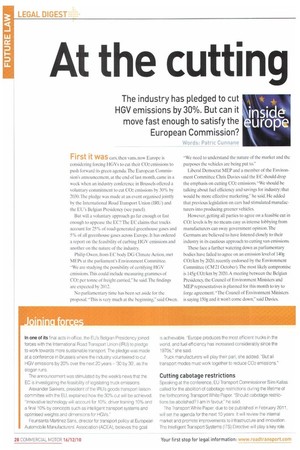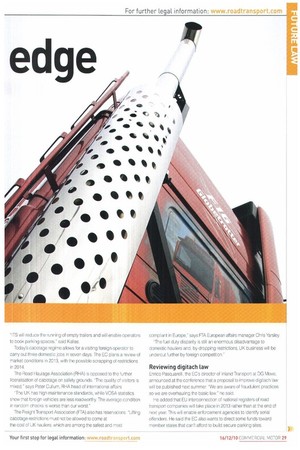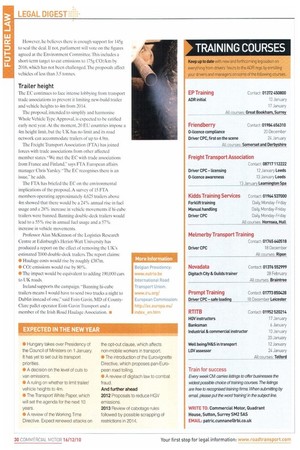In one of its final acts in office, the EU's
Page 28

Page 29

Page 30

If you've noticed an error in this article please click here to report it so we can fix it.
BelgianPresidency joined forces with the International Road Transport Union (IRU) to pledge to work towards more sustainable transport. The pledge was made at a conference in Brussels where the industry volunteered to cut HGV emissions by 20% over the next 20 years '30 by 30', as the slogan runs.
The announcement was stimulated by the week's news that the EC is investigating the feasibility of legislating truck emissions.
Alexander Sakkers, president of the IRUS goods transport liaison committee with the EU, explained how the 30% cut will be achieved. 'Innovative technology will account for 10%: driver training 10% and a final 10% by concepts such as intelligent transport systems and optimised weights and dimensions for HGVs.''
Feunsanta Martinez Sans, director for transport policy at European Automobile Manufacturers' Association (ACEA), believes the goal is achievable. "Europe produces the most efficient trucks in the world, and fuel efficiency has increased considerably since the 1970s," she said.
Truck manufacturers will play their part, she added. But all transport modes must work together to reduce CO2 emissions."
Cutting cabotage restrictions Speaking at the conference, EU Transport Commissioner Slim Kailas called for the abolition of cabotage restrictions during the lifetime of the forthcoming Transport White Paper. "Should cabotage restrictions be abolished? I am in favour," he said.
The Transport White Paper, due to be published in February 2011, will set the agenda for the next 10 years. It will review the internal market and promote improvements to infrastructure and innovation. The Intelligent Transport Systems (ITS) Directive will play a key role. "ITS will reduce the running of empty trailers and will enable operators to book parking spaces," said Kailas.
Today's cabotage regime allows for a visiting foreign operator to carry out three domestic jobs In seven days. The EC plans a review of market conditions in 2013, with the possible scrapping of restrictions in 2014.
The Road Haulage Association (RHA) Is opposed to the 'urther liberalisation of cabotage on safety grounds. The quality of visitors is mixed." says Peter Cullum, RHA head of international affairs ''The UK has high maintenance standards, while VOSA statistics show that foreign vehicles are less roadworthy. The average condition in random checks Is worse than our worst."
The Freight Transport Association (FTA) also has reservations. "Lifting cabotage restrictions must not be allowed to come at the cost of UK hauliers, which are among the safest and most compliant in Europe," says FTA European affairs manager Chris Yarsley. "The fuel duty disparity is still an enormous disadvantage to domestic hauliers and, by dropping restrictions, UK business will be undercut further by foreign competition.'
Reviewing digitach law
Enrico Pasquarelll. the EC s director of Inland Transport at DO Move, announced at the conference that a proposal to improve dIgitach law will be published next summer, "We are aware of fraudulent practices so we are overhauling the basic law." he said.
He added that EU interconnection of national registers of road transport companies will take place in 2013 rather than at the end of next year. This will enable enforcement agencies to identify serial offenders. He said the EC also wants to direct some funds toward member states that can't afford to build secure parking sites. However, he believes there is enough support for 145g to seal the deal. If not, parliament will vote on the figures agreed at the Environment Committee. This includes a short-term target to cut emissions to 175g CO2/km by 2016, which has not been challenged. The proposals affect vehicles of less than 3.5 tonnes.
Trailer height
The EC continues to face intense lobbying from transport trade associations to prevent it limiting new-build trailer and vehicle heights to 4m from 2014.
The proposal, intended to simplify and harmonise Whole Vehicle Type Approval, is expected to be ratified early next year. At the moment, 20 EU countries impose a 4m height limit, but the UK has no limit and its road network can accommodate trailers of up to 4.9m.
The Freight Transport Association (FTA) has joined forces with trade associations from other affected member states. "We met the EC with trade associations from France and Finland," says FTA European affairs manager Chris Yarsley."The EC recognises there is an issue." he adds.
The FTA has briefed the EC on the environmental implications of the proposal. A survey of 15 FTA members operating approximately 4,625 trailers above 4m showed that there would be a 24% annual rise in fuel usage and a 28% increase in vehicle movements if hi-cube trailers were banned. Banning double-deck trailers would lead to a 55% rise in annual fuel usage and a 57% increase in vehicle movements.
Professor Alan McKinnon of the Logistics Research Centre at Edinburgh's Heriot-Watt University has produced a report on the effect of removing the UK's estimated 7,000 double-deck trailers. The report claims: • Haulage costs would rise by roughly £.387m.
• CO2 emissions would rise by 80%.
• The impact would be equivalent to adding 190,000 cars to UK roads.
Ireland supports the campaign. Banning hi-cube trailers means I would have to send two trucks a night to Dublin instead of one," said Eoin Gavin, MD of CountyClare pallet operator Eoin Gavin Transport and a member of the Irish Road Haulage Association. •
























































































































